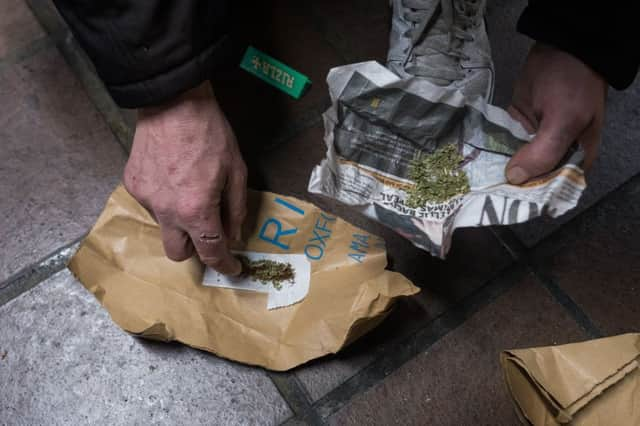Kenny MacAskill: In the war on drugs the enemy isn't some foreign foe but our own people


This despite Trainspotting 2 packing crowds in cinemas and a Spice epidemic afflicting Manchester, never mind causing havoc in prisons across England. Scotland isn’t immune to those problems. After all, what starts there invariably drifts north, and anyway it is already here. “Legal highs” as they are euphemistically known have become the major drug concern in Scottish penal institutions, though without the current level of violence affecting south of the Border. Police Scotland will also testify to the huge problems they face when these substances are mixed with alcohol; and as night follows day, mayhem descends.
It’s as if there’s a political vow of silence taken by the mainstream parties, other than stock responses and glib slogans. After all, it’s reserved to Westminster yet it’s one of the few policies the SNP have never really demanded be devolved. Creditably they supported the legalisation of medicinal cannabis at their annual conference last year. However, since then little has been done by the Scottish Government, to either have it delivered by London or devolved to Scotland. Yet many countries, including such far from swinging lands as Canada and Germany, have already sanctioned it. Even the Republic of Ireland is moving in that direction.
Advertisement
Hide AdAdvertisement
Hide AdThe Conservatives have taken the law and order line and ramped up the war on drugs. It’s a phrase that’s a misnomer, as the enemy isn’t some foreign foe but our own people. Moreover, many foot soldiers for the enemy side are in fact victims themselves. Labour has largely taken that view though less of a gung-ho attitude. The Lib Dems supported decriminalisation of cannabis but failed to act when having access to power.
It’s a hugely complex issue that challenges our society as well as every other, and it has through the centuries, as past crises evidence. Yet it devastates not just individuals but entire communities. It strains our health service, challenges our law enforcement agencies and has even seen areas of our economy infiltered and subverted.
However, I say as a former Justice Secretary that our drug strategy is failing. In that I don’t blame the police, front-line health workers or anyone else working in the often squalid and tragic zones that drug taking can habituate. They do their best to implement the law and mitigate harm, seeking to counsel the vulnerable and target the villains, but it’s a thankless and never-ending task. Moreover, as a senior police officer said to me: what’s the percentage of drugs intercepted, as opposed to what gets through? He ventured a random guess of a small fraction. If it’s a war, we’re losing.
I’m also minded of a very successful businessman friend who once commented that if the policy was a business strategy it would have been changed long ago. But, it isn’t and it hasn’t. Instead we persist with the same tactics that have failed before.
And this is the position despite the drug issue changing. I recall when I first took office, heroin was the major problem affecting inmates at HMP Cornton Vale. By the time I demitted office, it was alcohol mixed with other narcotic substances. Yet the policy remains the same, despite the challenges changing.
Furthermore, when I entered into office the enforcement of a drug debt was by a stab to the buttocks. Now it’s more likely to be the production and sometimes use of a firearm. Drug warrants that I signed off invariably had the two detailed together like salt and pepper. Targeted killings and random shootings are now happening in our cities. It’ll only get worse.
The “let’s get tough” and “laws can solve it” argument saw the Tories bring in the Psychedelic Substances Act to address legal highs. I am again reminded of a sage comment this time from a former prisons chief. He stated that if prohibition hadn’t worked with alcohol which was a low-value, high-visibility substance, how could it possibly cope with white powder and other substances that are invariably high value and low visibility?
He was right as the “zombie nation” that’s marauding Manchester means that even the police are saying that the new laws have made the situation worse. The laws have pushed the drug underground, put up the price and ensured that there’s no check or regulation on what’s being sold.
Advertisement
Hide AdAdvertisement
Hide AdIt’s not just that the law is failing but that it is held in contempt. Some of it is generational but there are huge swathes of our society who now see some drug or drug use as legitimate and laws against them as unfair. Once the law lacks credibility then enforcement becomes hugely difficult as other laws have discovered.
I don’t think there’s an absolute solution and any politician who promises one is either a liar or a fool. Drug abuse like alcohol abuse is symptomatic of a wider malaise and most often tied in with personal issues whether mental health, suffering and deprivation.
The solution should be cross-party agreement for a Royal Commission to Review Policy. The status quo is no longer tenable. Other options do exist and should be explored. Medicinal cannabis has been shown to have benefits and should be capable of being prescribed. Changes are happening all over the world. Even when Trump was winning in America, states were voting to legalise or decrimalise cannabis. Canada has followed suit.
There’s also the Portuguese model where drug-taking is viewed primarily as a health problem. It’s not the promised land but drug deaths are down, as is consumption, but the money and consequently the violence and corruption have been significantly reduced. The apocalypse predicted, of every drug addict in Europe moving to the Algarve, hasn’t happened.
Drugs should be discussed in this election but sadly I fear this issue will remain on the screens and in the streets only.